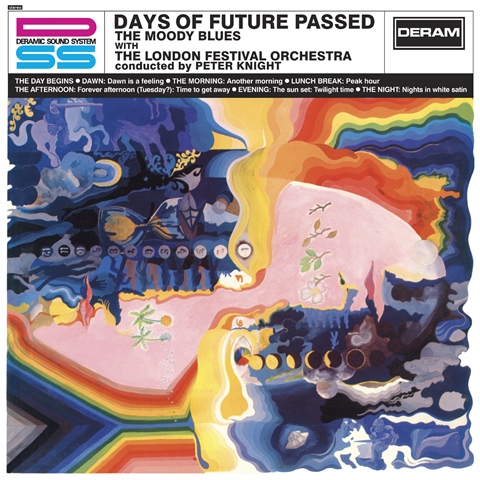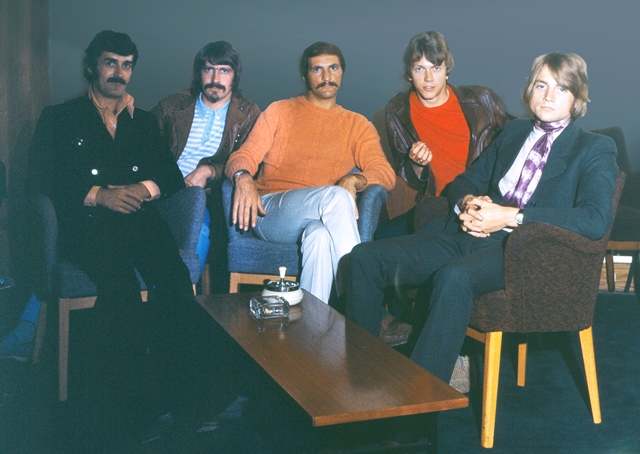Reissue CDs Weekly: The Moody Blues | reviews, news & interviews
Reissue CDs Weekly: The Moody Blues
Reissue CDs Weekly: The Moody Blues
The majestic ‘Days of Future Passed’ is given a 50th-anniversary makeover

In early 1965, Birmingham’s The Moody Blues topped the British charts with a forceful reinterpretation of Bessie Banks’ R&B ballad “Go Now”. In early 1968, after some line-up changes and a radical musical rethink, they hit 19 with “Nights in White Satin”. Although as moody as “Go Now”, this was a different Moody Blues.
“Nights in White Satin” is a staple of oldies radio and, as such, has been robbed of much of its power to astonish. Nonetheless, it was bold. As was its parent album Days of Future Passed. At one stroke, The Moody Blues invented orchestral pop and pointed the way to progressive rock. It is unlikely Genesis and King Crimson would have been what they were without them. Possibly Yes too.
 The shift from R&B and soul to a fresh sound falling in line with psychedelia wasn’t unique. The Beatles had done so in stages. More abruptly, so had The Alan Bown, Eric Burdon, Zoot Money and (out of the public eye) Pink Floyd. In the liner notes to a new and splendid 50th-anniversary edition of their Days of Future Passed album, The Moody Blues’ Justin Hayward – who joined in September 1966 – explains what generated their transformation. It happened after a show at The Fiesta Club in Stockton-On-Tees.
The shift from R&B and soul to a fresh sound falling in line with psychedelia wasn’t unique. The Beatles had done so in stages. More abruptly, so had The Alan Bown, Eric Burdon, Zoot Money and (out of the public eye) Pink Floyd. In the liner notes to a new and splendid 50th-anniversary edition of their Days of Future Passed album, The Moody Blues’ Justin Hayward – who joined in September 1966 – explains what generated their transformation. It happened after a show at The Fiesta Club in Stockton-On-Tees.
“A guy came back to our dressing room after the show,” reveals Hayward. “He said ‘you’re the worst band I’ve ever seen in my life. I take the wife out every Thursday night, spend two pounds and ten shillings and you’re bloody terrible. I just thought someone should tell you.’ We were stunned, but in the van on the way home that night we all realised that he was right. We weren’t very good. We had been playing music that wasn’t suited to our characters. We were lower middle class English boys singing about life in the deep south of the USA and it just wasn’t honest. As soon as we began to express our own feelings and to create our own music our fortunes changed.”
Pondering what they were told, they began to exploit the Mellotron they had bought. The sampling keyboard played tape loops, on which any sound which could be recorded and had helped define the atmosphere of The Beatles’ “Strawberry Fields Forever”. Armed thus, The Moody Blues decamped to Belgium, worked on new songs and began playing two separate sets at live shows: the first featured the old, R&B and soul-slated material; the second with band-member Ray Thomas on flute, the Mellotron and a repertoire of new, expansive songs. Days of Future Passed was taking shape.
In practical terms, The Moody Blues were at a make or break point. They had a £5000 debt with their record label and were teamed with producer Tony Clarke and arranger Peter Knight to make a version of Dvorak’s Symphony No. 9 with an orchestra. The idea was discarded once the band disclosed they had their own song cycle: one loosely telling the story of the passage of a day. What they created can be seen as two sides of overblown cheese. But it is not. Days of Future Passed is crammed with beautiful, sensitively rendered songs. The orchestration balances perfectly with the band’s questing instrumental line-up and poised vocals.
 Anyone who has previous CD versions of Days of Future Passed needs this new, three-disc configuration as it marks the first digital appearance of the 1967 stereo mix as it was issued then. The original master tape was damaged so, for all versions of the album released from 1972 and later, a mix made then from the multi-tracks was used. Now, the 1967 master has been repaired and the album can be heard as intended. For reference, the 1972 version is heard on Disc Two.
Anyone who has previous CD versions of Days of Future Passed needs this new, three-disc configuration as it marks the first digital appearance of the 1967 stereo mix as it was issued then. The original master tape was damaged so, for all versions of the album released from 1972 and later, a mix made then from the multi-tracks was used. Now, the 1967 master has been repaired and the album can be heard as intended. For reference, the 1972 version is heard on Disc Two.
The other bonuses include, on Disc One, three BBC radio sessions which reveal the band could play these lush songs outside a standard recording studio. The earliest includes an eccentric, jarring, take on The Animals' “Don’t Let me be Misunderstood” showing them still to have been in a transitional phase. The extras on Disc Two feature the uniformly superb non-album singles and B-sides from the era as well as engaging stripped-down mixes of album cuts with no orchestration. Disc Three is a DVD collecting a new surround-sound mix drawing from a 1972 Quadrophonic version of the album. The DVD’s most exciting feature, though, is footage of the band playing France’s MIDEM music business conference in January 1968. Amazingly, over three songs, they pull off the Days of Future Passed approach on stage.
Days of Future Passed defined – and, of course, it took its lead from The Beatles – a new way of framing pop music. And due to its assured songs, it also stands apart as a landmark solely for what the band composed. With this astute, well thought out reissue, it once again makes the case for itself.
- Next week: Intriguing best-of dedicated to Phil Seymour – dubbed, in the title, the Prince of Power Pop
- Read more reissue reviews on theartsdesk
Share this article
The future of Arts Journalism
You can stop theartsdesk.com closing!
We urgently need financing to survive. Our fundraising drive has thus far raised £49,000 but we need to reach £100,000 or we will be forced to close. Please contribute here: https://gofund.me/c3f6033d
And if you can forward this information to anyone who might assist, we’d be grateful.

Subscribe to theartsdesk.com
Thank you for continuing to read our work on theartsdesk.com. For unlimited access to every article in its entirety, including our archive of more than 15,000 pieces, we're asking for £5 per month or £40 per year. We feel it's a very good deal, and hope you do too.
To take a subscription now simply click here.
And if you're looking for that extra gift for a friend or family member, why not treat them to a theartsdesk.com gift subscription?
more New music
 Solar Eyes, Hare & Hounds, Birmingham review - local lads lay down some new tunes for a home crowd
Psychedelic indie dance music marinated in swirling dry ice
Solar Eyes, Hare & Hounds, Birmingham review - local lads lay down some new tunes for a home crowd
Psychedelic indie dance music marinated in swirling dry ice
 The Lemonheads' 'Love Chant' is a fine return to form
Evan Dando finally gets back in the saddle with an album of new tunes
The Lemonheads' 'Love Chant' is a fine return to form
Evan Dando finally gets back in the saddle with an album of new tunes
 Music Reissues Weekly: Evie Sands - I Can’t Let Go
Diligent, treasure-packed tribute to one of Sixties’ America’s great vocal stylists
Music Reissues Weekly: Evie Sands - I Can’t Let Go
Diligent, treasure-packed tribute to one of Sixties’ America’s great vocal stylists
 'Deadbeat': Tame Impala's downbeat rave-inspired latest
Fifth album from Australian project grooves but falls flat
'Deadbeat': Tame Impala's downbeat rave-inspired latest
Fifth album from Australian project grooves but falls flat
 Heartbreak and soaring beauty on Chrissie Hynde & Pals' Duets Special
The great Pretender at her most romantic and on the form of her life
Heartbreak and soaring beauty on Chrissie Hynde & Pals' Duets Special
The great Pretender at her most romantic and on the form of her life
 The Last Dinner Party's 'From the Pyre' is as enjoyable as it is over-the-top
Musically sophisticated five-piece ramp up the excesses but remain contagiously pop
The Last Dinner Party's 'From the Pyre' is as enjoyable as it is over-the-top
Musically sophisticated five-piece ramp up the excesses but remain contagiously pop
 Moroccan Gnawa comes to Manhattan with 'Saha Gnawa'
Trance and tradition meet Afrofuturism in Manhattan
Moroccan Gnawa comes to Manhattan with 'Saha Gnawa'
Trance and tradition meet Afrofuturism in Manhattan
 Soulwax’s 'All Systems Are Lying' lays down some tasty yet gritty electro-pop
Belgian dancefloor veterans return to the fray with a dark, pop-orientated sound
Soulwax’s 'All Systems Are Lying' lays down some tasty yet gritty electro-pop
Belgian dancefloor veterans return to the fray with a dark, pop-orientated sound
 Music Reissues Weekly: Marc and the Mambas - Three Black Nights Of Little Black Bites
When Marc Almond took time out from Soft Cell
Music Reissues Weekly: Marc and the Mambas - Three Black Nights Of Little Black Bites
When Marc Almond took time out from Soft Cell
 Album: Mobb Deep - Infinite
A solid tribute to a legendary history
Album: Mobb Deep - Infinite
A solid tribute to a legendary history
 Album: Boz Scaggs - Detour
Smooth and soulful standards from an old pro
Album: Boz Scaggs - Detour
Smooth and soulful standards from an old pro
 Emily A. Sprague realises a Japanese dream on 'Cloud Time'
A set of live improvisations that drift in and out of real beauty
Emily A. Sprague realises a Japanese dream on 'Cloud Time'
A set of live improvisations that drift in and out of real beauty

Add comment